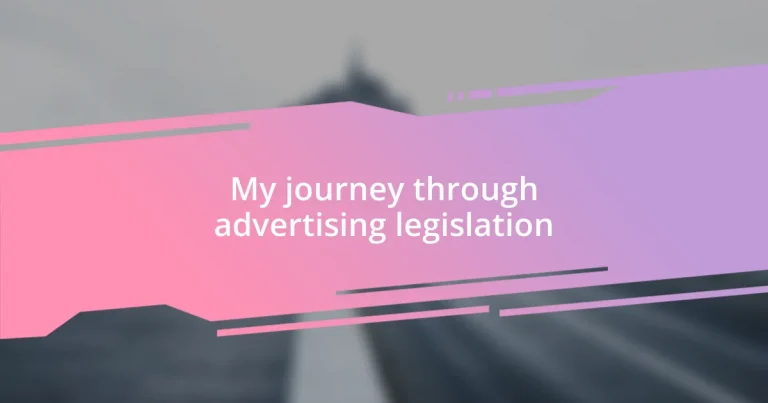Key takeaways:
- Advertising legislation balances creativity and compliance, fostering transparency and trust between advertisers and consumers.
- Understanding key laws like FTC regulations, intellectual property laws, and GDPR is essential for ethical advertising and protecting creative integrity.
- Future trends in advertising regulations will emphasize data privacy, social responsibility, and stricter rules for influencer marketing to ensure ethical practices.
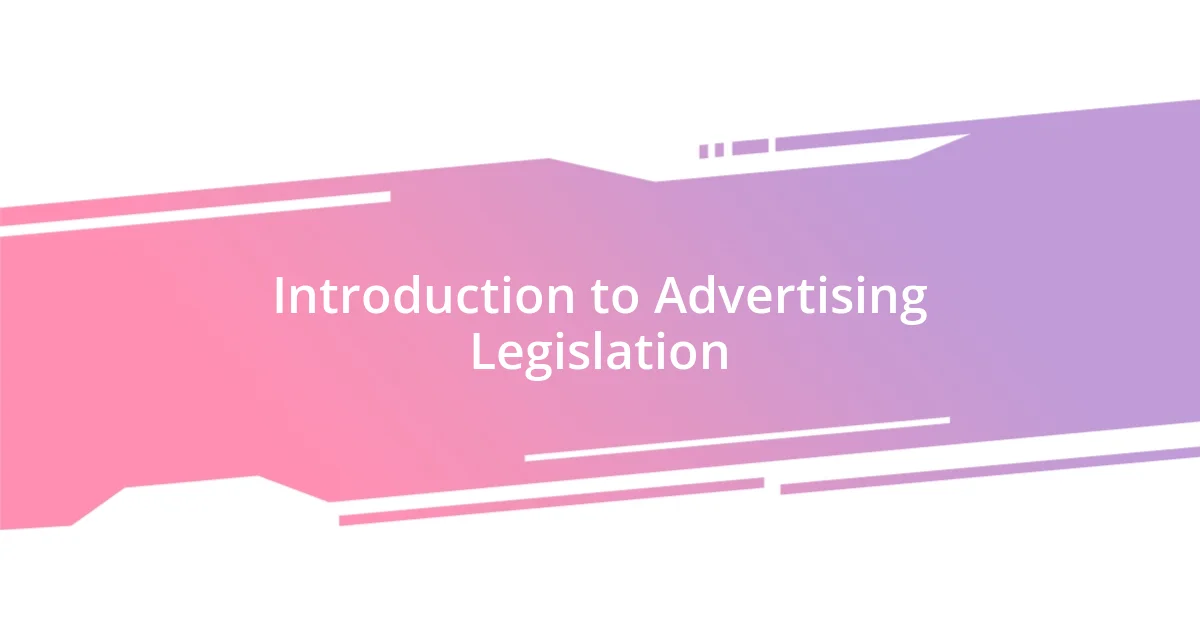
Introduction to Advertising Legislation
Advertising legislation is a fascinating area, balancing creativity with the necessity for protection. I remember my initial days in the industry, bubbling with ideas but also grappling with the rules that seemed stifling at first. Have you ever felt that tension between wanting to innovate and the fear of running afoul of legal repercussions?
As I delved deeper into this field, I began to appreciate how legislation serves as a crucial guideline. It’s not just about restrictions; it aims to foster transparency and build trust between businesses and consumers. Imagine creating an ad that resonates with your audience only to discover later that it violates a regulation – the emotional rollercoaster can be intense!
Understanding these laws can feel overwhelming, but my experience has taught me that they’re designed to protect both the advertiser and the consumer. The journey through advertising legislation transforms from a daunting task into an empowering journey, guiding our creativity while ensuring ethical conduct. Isn’t it reassuring to know that there’s a framework that ensures ads are honest and responsible?
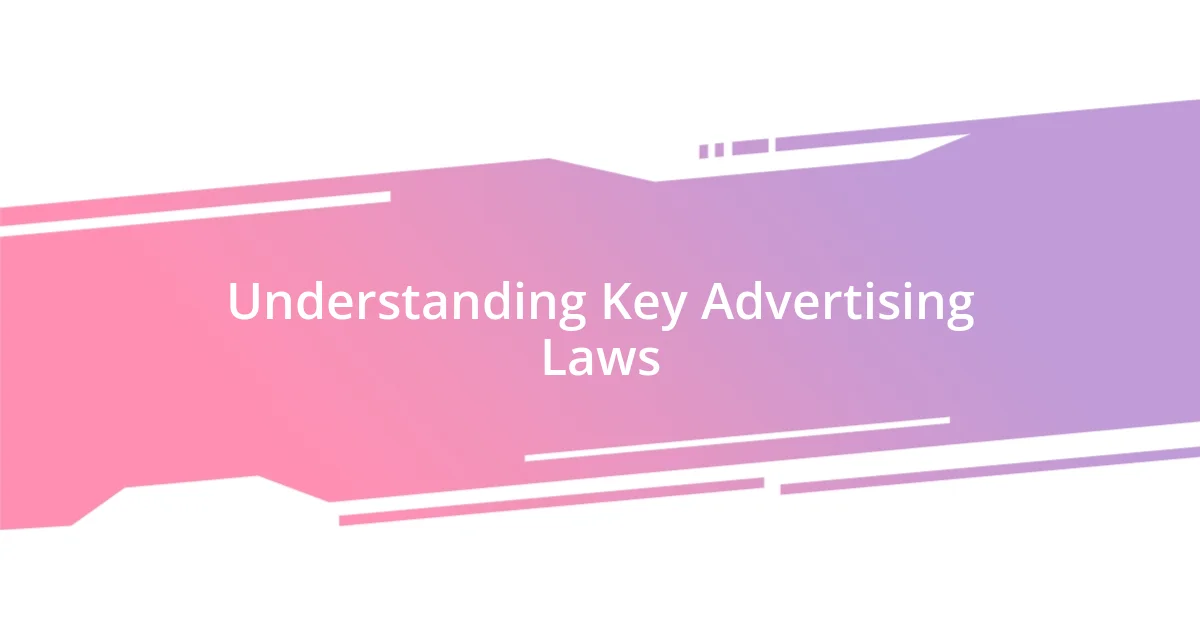
Understanding Key Advertising Laws
Understanding advertising laws can initially seem like a maze, but I assure you, it’s essential for success. For instance, when I first encountered the Federal Trade Commission (FTC) regulations, it felt daunting. These rules promote truthfulness in advertising and prevent misleading claims. I vividly remember crafting a promotional campaign and nervously double-checking every statement to ensure it aligned with these guidelines, learning that diligence pays off in building credibility with the audience.
Another vital aspect to consider is the importance of intellectual property laws. I once had an idea for a campaign based on a popular song, only to realize the risks involved without proper licensing. The experience taught me that respecting copyright doesn’t just protect the artists; it safeguards our creative integrity as advertisers. Have you ever navigated a situation where you had to balance creativity with legality? I certainly have, and it’s a constant reminder that innovation thrives best when guided by respect for the law.
Lastly, it’s crucial to stay updated with advertising laws, as they evolve over time. When the GDPR regulations rolled out, I felt a twinge of apprehension about how it would affect targeted advertising. I quickly realized that these regulations prioritize consumer privacy, an increasingly important characteristic for fostering trust. Engaging in ongoing education not only equips us with knowledge but also enhances our ability to create ads that resonate with conscientious consumers.
| Key Advertising Law | Description |
|---|---|
| FTC Regulations | Ensures truthfulness in advertising to prevent misleading claims. |
| Intellectual Property Law | Protects original works and ensures proper licensing in advertising. |
| GDPR | Focuses on consumer privacy and data protection in advertising practices. |

My Initial Experiences in Advertising
In the beginning, the world of advertising felt like stepping into uncharted territory. I can still recall the adrenaline rush of brainstorming sessions, where each idea seemed like gold. But I quickly faced the reality of navigating compliance. There were moments of sheer panic when I realized my creative spark might be dampened by regulations. It taught me that creativity flourishes not in isolation but within the framework of legal guidelines.
- The thrill of crafting catchy slogans contrasted with the monumental task of ensuring they adhered to truth-in-advertising laws.
- I remember sweating through a pitch meeting, worried that a particular phrase might be deemed misleading.
- Learning about proper disclosures felt like unlocking a new level in this game of advertising.
Each experience not only pushed my boundaries but became a valuable lesson in respecting the delicate balance between creativity and compliance. The challenge is real, but it’s empowering to know that every rule is rooted in protecting both us and our audience.
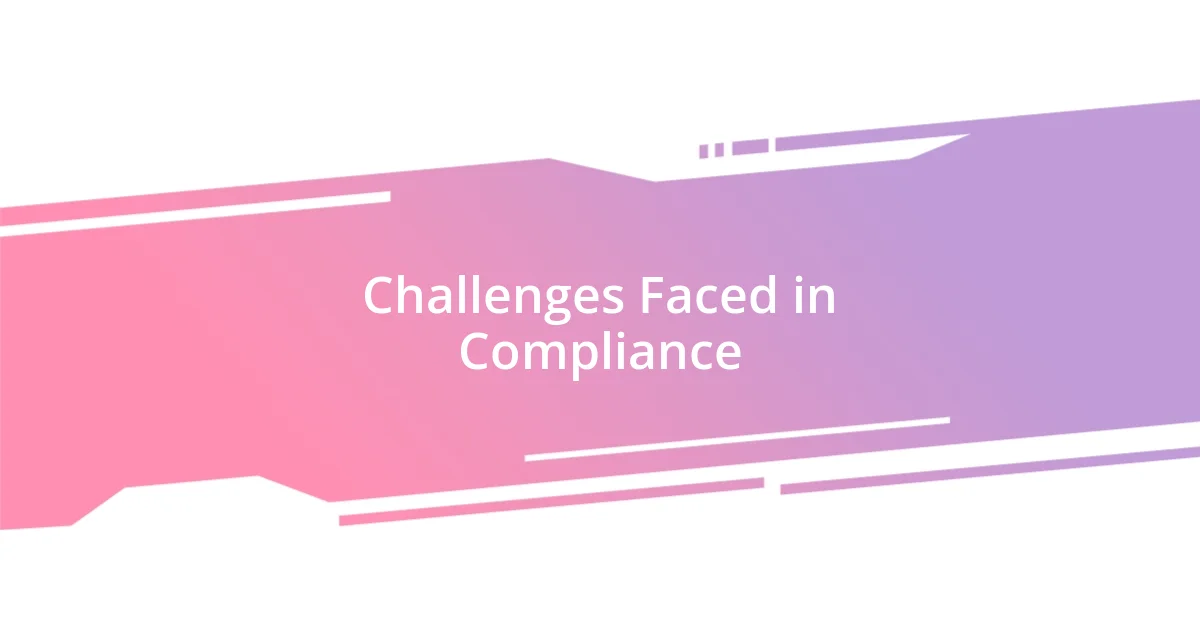
Challenges Faced in Compliance
Navigating compliance in advertising can feel like a rollercoaster ride, and I’ve certainly had my share of twists and turns. I remember launching a social media campaign only to discover it violated platform-specific ad guidelines. The anxiety of potentially facing penalties took me by surprise. Have you ever felt that sinking feeling of oversight? It taught me that attention to detail is crucial, as overlooking even the smallest requirement can lead to significant setbacks.
One particular challenge that stands out for me is adapting to new legislation. When the CAN-SPAM Act was implemented, I had clients questioning the impact on their email marketing strategies. I recall spending late nights researching and reworking campaigns to ensure compliance, transforming my understanding from reactive to proactive. It’s a continuous struggle to keep pace with evolving laws, especially when managing client expectations. How do we balance what’s legally required with what resonates with our audience? Finding that equilibrium has become a core focus in my approach.
Additionally, the pressure of documenting everything can be overwhelming. I’ve often found myself juggling compliance checklists while trying to maintain creativity in campaigns. I was knee-deep in project meetings, and the task of tracking every advertisement for proper documentation felt daunting. Yet, I’ve learned that creating structured workflows not only mitigates compliance issues but also encourages collaborative creativity. How often do we overlook organization in favor of spontaneity? Embracing this structure has proven to be a game-changer in my journey, transforming challenges into opportunities for growth.
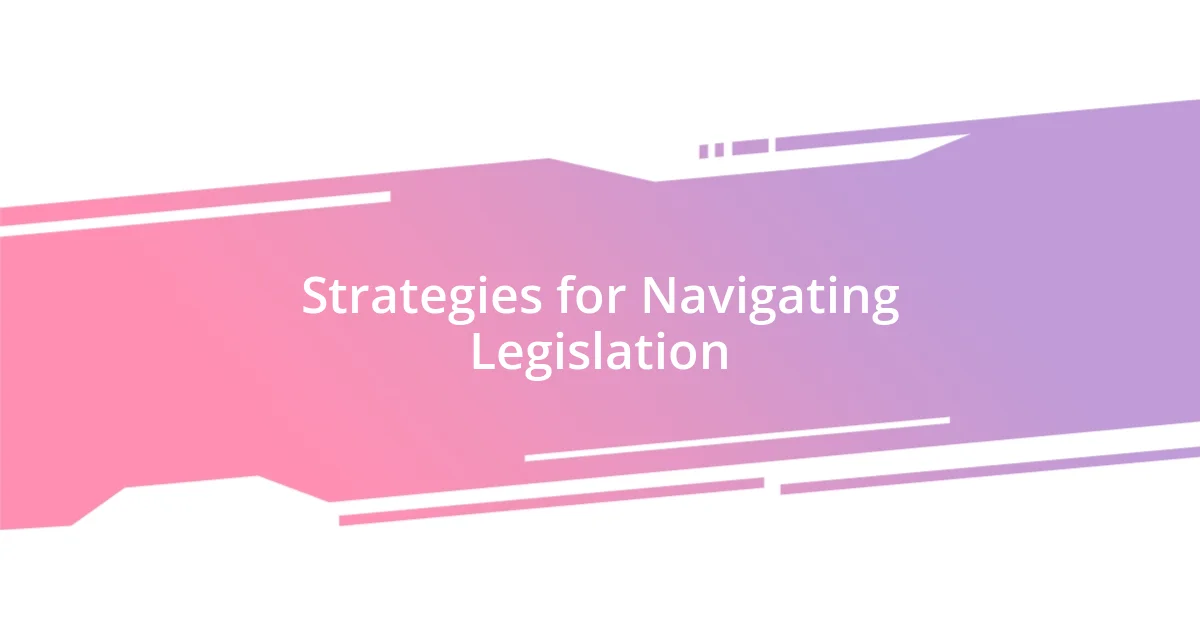
Strategies for Navigating Legislation
When I first delved into the intricate web of advertising legislation, I quickly learned that staying organized could be my best ally. I remember developing a checklist for compliance that seemed to save me in numerous situations. It wasn’t just a mere piece of paper; it became my safety net, allowing me to focus my energy on creativity instead of drowning in legal jargon. Have you ever had that sigh of relief when you finally crossed a big task off your list? That feeling made every effort toward meticulous planning feel worthwhile.
Collaboration emerged as another crucial strategy in my journey. I found that bouncing ideas off colleagues brought fresh perspectives and uncovered potential pitfalls I might have overlooked myself. One particularly lively brainstorming session resulted in refining a campaign to highlight necessary disclosures while maintaining our brand’s voice. It made me realize how sharing the load not only boosts creativity but also fortifies compliance. Doesn’t it feel rewarding when you witness a team come together to craft something remarkable?
Finally, I discovered that educating myself on legislative changes isn’t just beneficial—it’s empowering. I remember attending a workshop that focused specifically on the nuances of digital advertising regulations. The knowledge I gained that day transformed my approach to campaigns and gave me confidence during client meetings. It’s essential to engage with the community and continually seek out new information. How often do we let uncertainty hinder our progress? Embracing a mindset of continuous learning has drastically improved my ability to navigate the complexities of advertising legislation.
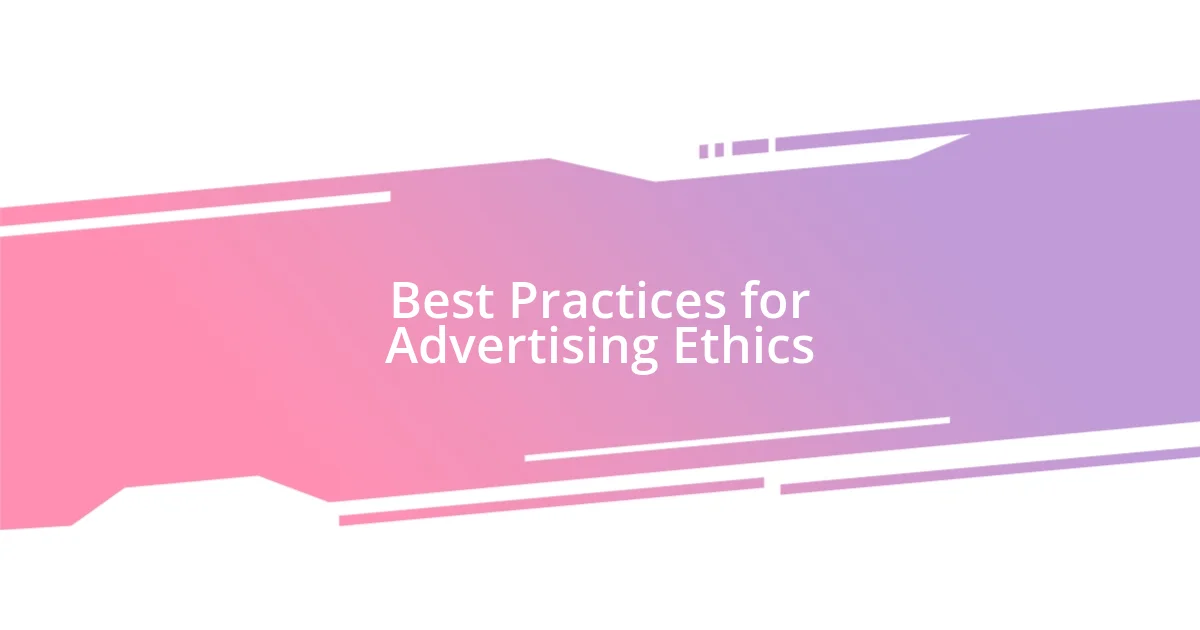
Best Practices for Advertising Ethics
Best practices in advertising ethics hinge on a strong foundation of honesty and transparency. One evening, while finalizing an ad campaign, I found myself in a dilemma. We had an exciting product with claims that sounded great but felt stretched. I paused and asked, “Can we genuinely back this up?” That moment of reflection taught me to prioritize integrity; being straightforward fosters trust with consumers and builds long-lasting relationships.
Another essential practice I’ve embraced is to prioritize inclusivity and sensitivity in messaging. I recall a time when our team was developing an ad focused on a social issue. As we worked, I felt a strong urge to ensure we weren’t just checking boxes but genuinely representing diverse perspectives. Engaging with individuals from varied backgrounds created a richer campaign that resonated more authentically. How can we expect our audience to connect if we don’t see the world through their eyes? This lesson reinforced the idea that ethics isn’t just about compliance; it’s about creating meaningful connections.
Lastly, establishing a robust feedback mechanism has been invaluable. I remember launching a campaign I thought was spot-on, only to receive mixed reactions from our audience. That experience was eye-opening. It’s crucial to listen actively and adapt in real-time to what consumers are saying. I learned that inviting criticism can be uncomfortable, but it’s a powerful way to reinforce ethical standards. After all, isn’t it our responsibility to serve our audience rather than just promote our products?
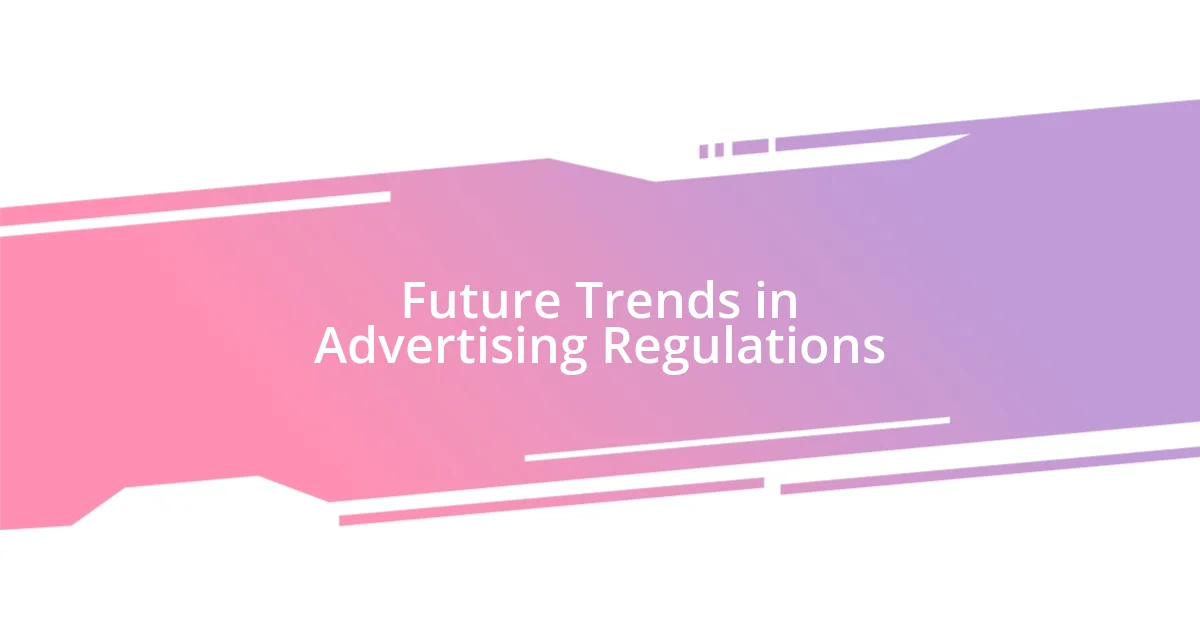
Future Trends in Advertising Regulations
One of the most pressing future trends I see in advertising regulations is the growing emphasis on data privacy. As I’ve navigated through various campaigns, I’ve often reflected on how much information we gather from consumers. With regulations like GDPR in Europe and CCPA in California making waves, the way we handle data will not only need to comply but will also demand transparency. Have you ever felt uncomfortable with how your data is used? That’s a feeling more consumers are experiencing, pushing brands to rethink their strategies to prioritize ethical data practices.
Another trend that has caught my attention is the focus on social responsibility in advertising. I recall a particular project where we chose to align our messaging with environmental sustainability. The positive feedback we received showed me that consumers now expect brands to take stances on social issues. How can we remain indifferent when our audience is calling for relevant and responsible messaging? As demand for ethical advertising grows, I foresee stricter regulations that will hold companies accountable for truthfulness in their claims and their overall impact on society.
Lastly, I believe we’ll witness increased regulation around digital platforms, especially concerning influencer marketing. I remember coordinating an influencer campaign and realizing that transparency in sponsorships was paramount. The lines blurred between genuine endorsement and paid promotion, leading to a conversation about what constitutes honest communication. Isn’t it time we set clearer boundaries to protect consumers from misleading influences? I envision future regulations enforcing stricter disclosure requirements, ensuring that audiences are well-informed about the nature of influencer partnerships. This shift will not only safeguard consumers but also bolster trust between brands and their audiences.












